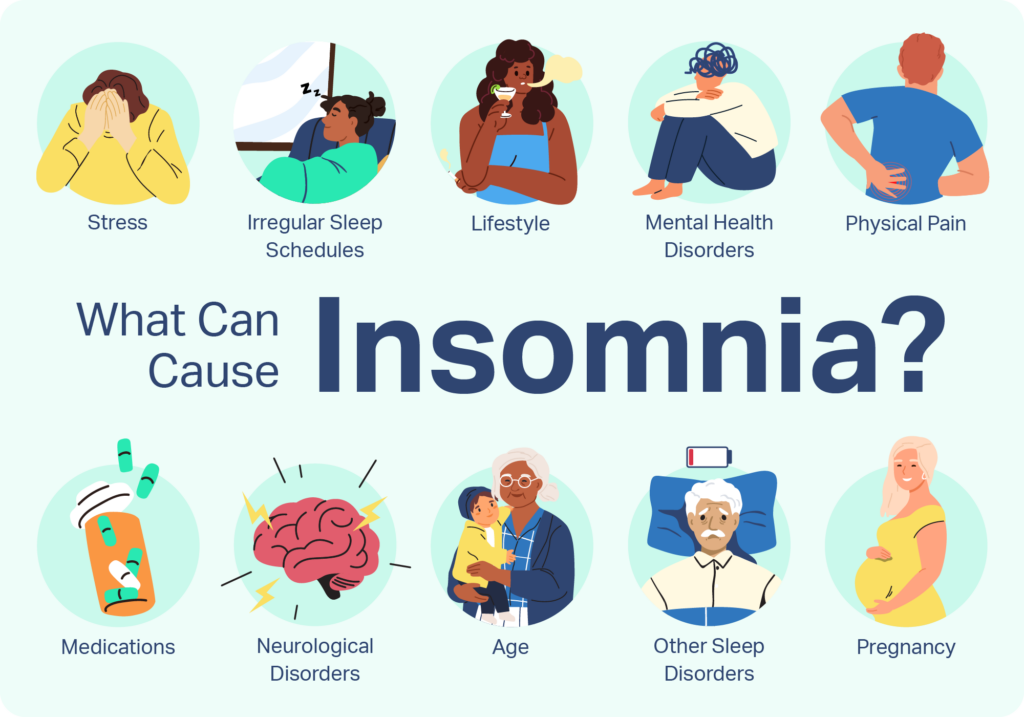The Best Natural Solutions for Insomnia and Sleeplessness

Understanding Insomnia and Sleeplessness

Insomnia and sleeplessness are common sleep disorders that affect millions of people worldwide. They are characterized by difficulty falling asleep, staying asleep, or experiencing poor quality sleep. These conditions can have a significant impact on an individual’s overall health and well-being.
When it comes to understanding insomnia and sleeplessness, it is important to recognize that they are not just temporary bouts of sleeplessness, but rather long-term disruptions to the sleep-wake cycle. Insomnia can be acute, lasting for a short period, or chronic, persisting for months or even years. Sleeplessness, on the other hand, refers to the inability to obtain sufficient sleep, regardless of the duration.
There are several factors that can contribute to the development of insomnia and sleeplessness. Physical conditions such as chronic pain, hormonal imbalances, and respiratory disorders can disrupt sleep patterns. Psychological factors like stress, anxiety, and depression can also play a role. Lifestyle choices such as irregular sleep schedules, excessive caffeine or alcohol intake, and disruptive sleep environments can further exacerbate these conditions.
Understanding the causes of insomnia and sleeplessness is crucial in order to effectively manage and treat them. In the following sections, we will delve deeper into the various aspects of these sleep disorders, including their impact on health, strategies for establishing a consistent sleep schedule, creating a relaxing bedtime routine, optimizing the sleep environment, managing stress and anxiety, and exploring natural sleep aids and supplements. We will also discuss the benefits of cognitive behavioral therapy and the role of exercise in promoting better sleep. It is our hope that through this comprehensive exploration, readers will gain the necessary insights to improve their sleep and overall well-being.
The Impact of Insomnia on Your Health
Insomnia, the persistent inability to fall asleep or stay asleep, can have a significant impact on your overall health. The consequences of chronic sleeplessness go far beyond feeling fatigued and irritable throughout the day. Research has linked insomnia to various health conditions, both physical and mental.
One major concern associated with insomnia is its impact on cardiovascular health. Studies have found that individuals with chronic sleep problems may be at a higher risk of developing hypertension, coronary heart disease, and even stroke. Lack of sleep can disrupt the body’s ability to regulate blood pressure, leading to increased stress on the cardiovascular system. Additionally, sleep disturbances have been linked to an increased risk of heart failure, particularly in individuals with underlying cardiovascular conditions.
In addition to its effects on cardiovascular health, insomnia can also take a toll on mental well-being. Sleep deprivation has been strongly associated with an increased risk of developing mood disorders, such as depression and anxiety. Chronic insomnia can exacerbate existing mental health conditions or contribute to their onset. Furthermore, individuals struggling with insomnia often report difficulties with concentration, memory, and overall cognitive function. The negative impact on mental clarity and cognitive abilities can hinder daily productivity and quality of life.
It is evident that the impact of insomnia extends beyond a simple lack of sleep. By understanding the potential consequences, we can better appreciate the importance of addressing this sleep disorder. In future sections of this article, we will delve into the various causes of insomnia and explore effective strategies to improve sleep quality and overall health.
Identifying the Causes of Insomnia
Insomnia is a complex sleep disorder that affects a significant portion of the population. While it may seem like a vague term, there are several identifiable causes that can contribute to the development of insomnia. One common cause is lifestyle factors, such as irregular sleep schedules, excessive caffeine or alcohol consumption, and high levels of stress. These factors can disrupt the body’s natural sleep-wake cycle and make it difficult for individuals to fall asleep or stay asleep throughout the night.
Another potential cause of insomnia is underlying medical conditions. Conditions such as chronic pain, respiratory disorders, hormonal imbalances, and psychiatric disorders can all significantly impact an individual’s ability to achieve restful sleep. It is important to note that insomnia can also be a symptom of other sleep disorders, such as sleep apnea or restless leg syndrome. In these cases, identifying and treating the underlying sleep disorder is essential in resolving the insomnia. A comprehensive evaluation by a healthcare professional is often necessary to pinpoint the specific cause or causes of insomnia in each individual case. By identifying the underlying factors contributing to insomnia, targeted interventions can be implemented to promote better sleep hygiene and improve overall sleep quality.
Here’s information on identifying the causes of insomnia:
| Causes of Insomnia | Key Concepts | Credible Source |
|---|---|---|
| Psychological Factors | Stress, anxiety, and depression contribute to insomnia. | National Sleep Foundation |
| Poor Sleep Hygiene | Irregular schedules and disruptive bedtime routines can cause insomnia. | Mayo Clinic |
| Medical Conditions | Chronic pain, respiratory issues, and hormonal disorders can lead to insomnia. | Harvard Health Publishing |
| Medications and Substance Use | Certain medications and substances may contribute to insomnia. | Sleep Foundation |
| Shift Work and Irregular Schedules | Irregular work hours can disrupt the natural sleep-wake cycle. | American Academy of Sleep Medicine |
Establishing a Consistent Sleep Schedule
A consistent sleep schedule plays a crucial role in maintaining good sleep hygiene and overall well-being. By going to bed and waking up at the same time every day, you can regulate your body’s internal clock, known as the circadian rhythm. This consistency helps synchronize various bodily functions and promotes healthy sleep patterns.
When establishing a consistent sleep schedule, it’s important to prioritize enough time for sleep. Adults generally require between seven to nine hours of sleep each night, although individual needs may vary. Take into consideration your personal requirements and ensure your schedule allows for adequate sleep duration. Consistently meeting your sleep needs can enhance your cognitive function, mood, and physical health.
Maintaining a regular sleep routine can be challenging, especially with the demands of daily life. However, it’s essential to create a sleep schedule that aligns with your natural sleep-wake cycle. Consistency in sleep time helps regulate hormones, such as melatonin, that control sleep and wakefulness. Over time, this regularity will train your body to anticipate and prepare for sleep, making it easier to fall asleep and wake up refreshed.
Consider implementing a few strategies to establish a consistent sleep schedule. Set a specific bedtime and stick to it, even on weekends. Create a relaxing pre-bed routine that includes activities like reading a book, taking a warm bath, or practicing relaxation techniques. Avoid stimulating activities, such as using electronic devices or consuming caffeine, close to bedtime. Additionally, ensure your sleep environment is optimal – a cool, dark, and quiet room can promote better sleep quality.
By prioritizing and implementing a consistent sleep schedule, you can enhance your overall sleep quality and reap the benefits of a well-rested body and mind. However, it’s important to remember that individual differences may exist, and consulting with a healthcare professional may be helpful in tailoring your sleep routine to your specific needs.
Creating a Relaxing Bedtime Routine

Establishing a relaxing bedtime routine is crucial in promoting quality sleep and combatting insomnia. By incorporating a few simple steps into your evening routine, you can create an environment conducive to relaxation and set the stage for a restful night’s sleep.
Firstly, it is important to establish a consistent bedtime and wake-up time, even on weekends. This helps regulate your body’s internal clock, making it easier to fall asleep and wake up naturally. Additionally, try to create a relaxing pre-sleep ritual that allows you to unwind and signal to your body that it’s time to sleep. This could include activities such as reading a book, taking a warm bath, or practicing relaxation techniques like deep breathing or meditation. Avoid stimulating activities like working on your electronic devices or engaging in intense exercise within an hour before bed, as these can interfere with your ability to relax and sleep.
Creating a comfortable sleep environment is also essential for a relaxing bedtime routine. Ensure your bedroom is cool, quiet, and dark, as these conditions are known to promote better sleep quality. Investing in a quality mattress, pillows, and bedding that meet your specific needs can also greatly enhance your sleep experience. In addition, consider incorporating elements that help create a soothing atmosphere, such as calming scents, soft lighting, or white noise machines. By addressing both physical comfort and sensory inputs, you can optimize your sleep environment and support a more peaceful bedtime routine.
Remember, creating a relaxing bedtime routine is about preparing your mind and body for sleep. By establishing consistent sleep and wake times, engaging in relaxing activities, and optimizing your sleep environment, you can lay the foundation for a restful night’s sleep.
Optimizing Your Sleep Environment

Creating an optimal sleep environment is essential for promoting restful and rejuvenating sleep. By making simple adjustments to your bedroom, you can significantly improve the quality and duration of your sleep.
Firstly, it is important to ensure that your bedroom is dark and quiet. Light can disrupt the production of melatonin, a hormone that regulates sleep-wake cycles, so consider using blackout curtains or an eye mask to block out any unwanted light. Additionally, earplugs or a white noise machine can help minimize any external noises that may disturb your sleep.
Secondly, maintaining a comfortable temperature in your bedroom is vital for optimal sleep. The National Sleep Foundation recommends keeping your bedroom between 60 and 67 degrees Fahrenheit (15 to 19 degrees Celsius) for optimal sleep. Experiment with different blankets or sleepwear to find the right level of warmth that suits your preference and promotes uninterrupted sleep.
Thirdly, decluttering your bedroom and keeping it tidy can have a positive impact on your sleep. A clutter-free environment promotes a sense of calm and relaxation, allowing your mind to settle down before bedtime. Consider organizing your belongings, including clothes, books, and electronics, to create a serene and peaceful atmosphere in your bedroom.
Additionally, investing in a supportive and comfortable mattress, pillows, and bedding is crucial for optimizing your sleep environment. The right combination of these elements ensures proper body alignment and promotes healthy sleep posture, ultimately preventing discomfort or pain that can disrupt your sleep.
By making these adjustments to your sleep environment, you can create a haven dedicated to restorative sleep. Remember, a well-designed sleep environment sets the stage for quality sleep, helping you wake up refreshed and ready to take on the day.
Managing Stress and Anxiety for Better Sleep
Managing stress and anxiety is crucial for achieving better sleep and overall well-being. Chronic stress and anxiety can significantly disrupt our sleep patterns, leading to insomnia and sleeplessness. Stress activates the body’s “fight or flight” response, releasing stress hormones like cortisol, which can interfere with our ability to fall asleep and stay asleep.
To manage stress and anxiety effectively, it is essential to develop healthy coping mechanisms. Engaging in relaxation techniques, such as deep breathing exercises, progressive muscle relaxation, or mindfulness meditation, can help reduce stress levels and promote a sense of calmness before bedtime. These techniques work by activating the body’s relaxation response, which counteracts the stress response and helps prepare both the mind and body for a restful night’s sleep.
In addition to relaxation techniques, implementing stress management strategies throughout the day can also be beneficial. Prioritizing self-care activities like exercise, spending time in nature, or engaging in hobbies can help alleviate stress and anxiety. It is crucial to set realistic expectations and boundaries, delegating tasks when necessary, and seeking support from loved ones or professionals when managing overwhelming stress or anxiety. Remember, managing stress and anxiety is a continuous process that requires patience and consistency. With time and practice, you can create a more peaceful sleep environment conducive to restful nights and rejuvenated mornings.
The Role of Exercise in Promoting Sleep
Regular exercise has been shown to have numerous benefits for overall health and well-being, and its positive impact on sleep is no exception. Engaging in physical activity can play a pivotal role in promoting better sleep quality and duration. When we exercise, our body temperature rises, and afterwards, as our body cools down, it signals to our brain that it’s time for sleep. This natural cooling process helps to facilitate the onset of sleep and promotes a more restful night’s rest. Additionally, exercise has also been found to reduce symptoms of insomnia, such as difficulty falling asleep or staying asleep throughout the night.
Engaging in aerobic activities, such as brisk walking, jogging, or cycling, has particularly shown significant improvements in sleep quality. Even moderate-intensity activities, like yoga or low-impact exercises, can have beneficial effects. However, it is important to note that consistency is key when it comes to reaping the benefits of exercise for sleep. Aim for at least 30 minutes of moderate-intensity exercise most days of the week, but be mindful of your own fitness level and consult with a healthcare professional if you have any concerns or underlying health conditions. By incorporating exercise into your routine, you can help regulate your sleep-wake cycle and experience more restorative sleep.
Exploring Natural Sleep Aids and Supplements
When it comes to finding relief from insomnia, many individuals seek out natural sleep aids and supplements as an alternative to prescription medications. These options, derived from herbs, minerals, and other natural ingredients, offer a potential solution for those who prefer a more holistic approach to their sleep difficulties. However, it’s essential to approach these natural remedies with caution and seek guidance from a healthcare professional before incorporating them into your routine.
One popular natural sleep aid is melatonin, a hormone produced naturally by the body that helps regulate sleep-wake cycles. Melatonin supplements have been found to be effective in reducing the time it takes to fall asleep and improving overall sleep quality, particularly for those with insomnia. However, it’s important to note that melatonin should be used under the guidance of a healthcare professional, as proper dosage and timing are crucial for its effectiveness.
Another natural sleep aid that has gained attention is valerian root. Valerian is an herb that has been used for centuries to promote relaxation and sleep. Studies have shown that valerian root can help improve sleep quality and reduce the amount of time it takes to fall asleep. However, like melatonin, valerian should be used under the guidance of a healthcare professional, as it may interact with certain medications and cause unwanted side effects.
In summary, natural sleep aids and supplements can provide a potential avenue for those seeking relief from insomnia. However, it’s important to approach these options with caution and consult with a healthcare professional to ensure their safety and effectiveness. Remember, natural remedies are not a one-size-fits-all solution, and what may work for one person may not work for another. Ultimately, finding the right approach to managing your sleep difficulties may require a combination of natural remedies, lifestyle changes, and professional guidance.
The Power of Relaxation Techniques for Insomnia
In the quest for a good night’s sleep, one powerful tool that often goes overlooked is the use of relaxation techniques. These techniques, when practiced consistently, can help alleviate the symptoms of insomnia and promote deep, restful sleep. But what exactly are relaxation techniques, and how can they benefit those experiencing sleep difficulties?
Relaxation techniques are a set of practices that help calm the mind, reduce stress, and prepare the body for sleep. These techniques can include deep breathing exercises, progressive muscle relaxation, guided imagery, and meditation. By engaging in these activities before bedtime, individuals can activate the body’s relaxation response, which counteracts the effects of stress and promotes a sense of calm. Regular practice of relaxation techniques has been shown to improve sleep quality, decrease sleep latency, and reduce sleep disturbances. So, if you find yourself tossing and turning at night, consider incorporating relaxation techniques into your bedtime routine for a more peaceful slumber.
The Benefits of Cognitive Behavioral Therapy for Insomnia
Cognitive Behavioral Therapy (CBT) has emerged as a promising treatment option for individuals struggling with insomnia. This therapeutic approach focuses on identifying and modifying the thoughts and behaviors that contribute to sleep difficulties, ultimately aiming to improve sleep quality and duration.
One of the key benefits of CBT for insomnia is its effectiveness in addressing the underlying causes of sleeplessness. Unlike medications that simply treat symptoms, CBT seeks to tackle the root causes of insomnia, such as negative thoughts and anxiety surrounding sleep. Through various techniques, such as cognitive restructuring and relaxation training, CBT helps individuals identify and challenge unhelpful beliefs about sleep, leading to improved sleep patterns over time. Additionally, CBT helps establish healthy sleep habits and routines, promoting sleep hygiene and reinforcing the body’s natural sleep-wake cycle.
Implementing CBT techniques under the guidance of a trained therapist can lead to long-term improvements in sleep quality, without the potential risks and side effects associated with medications. However, it is important to note that the success of CBT for insomnia relies heavily on the individual’s commitment and engagement in the therapy process. Regular attendance to therapy sessions, along with adherence to recommended strategies and techniques, is crucial for achieving optimal results. So, if you are struggling with insomnia, consider exploring the potential benefits of Cognitive Behavioral Therapy with a trained therapist to help restore restful nights and improve your overall well-being.
Implementing Healthy Lifestyle Changes for Quality Sleep
Quality sleep is essential for overall health and well-being. To improve your sleep quality, certain healthy lifestyle changes can be implemented. First and foremost, it is important to establish a consistent sleep schedule. Going to bed and waking up at the same time every day, even on weekends, helps regulate your body’s internal clock and promotes better sleep.
In addition to a consistent sleep schedule, creating a relaxing bedtime routine can also enhance sleep quality. Engaging in calming activities, such as reading a book or taking a warm bath, can signal to your body that it’s time to wind down and prepare for sleep. It is advisable to avoid stimulating activities like watching TV or using electronic devices right before bed, as the blue light emitted by these devices can interfere with your natural sleep-wake cycle.
Furthermore, optimizing your sleep environment can greatly contribute to better sleep. Ensure your bedroom is cool, quiet, and dark to create a conducive atmosphere for quality rest. Investing in a comfortable mattress and pillows that provide adequate support is also crucial. Additionally, consider removing any distractions, such as electronic gadgets or clutter, from your bedroom to promote a calm and relaxing space solely dedicated to sleep.
By implementing these healthy lifestyle changes, you can significantly improve the quality of your sleep. However, it is important to note that individual sleep needs may vary, and it may take time to find the routine and environment that work best for you. It is always recommended to consult with a healthcare professional if you continue to face difficulties with sleep despite making these adjustments. Quality sleep is within reach, and with the right modifications, you can enhance your overall well-being and wake up feeling rested and rejuvenated.
Seeking Professional Help for Chronic Insomnia
For individuals who have been struggling with chronic insomnia, seeking professional help can be a crucial step towards finding relief and improving sleep quality. While occasional sleepless nights are a common occurrence for many people, chronic insomnia is characterized by persistent difficulty falling asleep, staying asleep, or getting restful sleep. This condition can have a significant impact on one’s overall health and well-being, affecting various aspects of daily life such as energy levels, mood, cognitive function, and productivity.
Professional help for chronic insomnia typically involves consulting with a healthcare provider who specializes in sleep disorders. These healthcare providers, which may include sleep specialists, neurologists, or psychologists, have the expertise to evaluate and diagnose the underlying causes of insomnia. Through a comprehensive assessment, they can identify any potential medical conditions, lifestyle factors, or psychological issues that may be contributing to the sleep problem. Once a diagnosis is made, a tailored treatment plan can be developed to address the specific needs and goals of the individual.
When seeking professional help for chronic insomnia, it is essential to choose a healthcare provider who has experience and training in sleep medicine. These specialists are knowledgeable about the latest research and treatments available for insomnia, and they can provide evidence-based recommendations to help improve sleep quality. Additionally, they may utilize various strategies such as cognitive-behavioral therapy for insomnia (CBT-I), which is a proven and effective approach for managing chronic insomnia without relying solely on medication.
Overall, seeking professional help for chronic insomnia is a proactive step towards better sleep. With the guidance and expertise of sleep specialists, individuals can gain a better understanding of their sleep patterns, identify potential underlying causes, and work towards establishing healthy sleep habits. Through a comprehensive and personalized approach, individuals can significantly improve their sleep quality and overall well-being.
What is chronic insomnia?
Chronic insomnia refers to a long-term pattern of difficulty falling asleep, staying asleep, or experiencing poor quality sleep, which persists for a month or longer.
How does chronic insomnia affect my health?
Chronic insomnia can have a significant impact on your physical and mental health. It may lead to daytime fatigue, difficulty concentrating, mood disturbances, decreased immune function, and an increased risk of developing certain medical conditions.
What are the common causes of insomnia?
Insomnia can be caused by various factors including stress, anxiety, depression, poor sleep hygiene, certain medications, chronic pain, medical conditions, and lifestyle factors such as caffeine or alcohol consumption.
How can I establish a consistent sleep schedule?
To establish a consistent sleep schedule, aim to go to bed and wake up at the same time every day, including weekends. This regularity helps regulate your body’s internal clock, making it easier to fall asleep and wake up.
What can I do to create a relaxing bedtime routine?
A relaxing bedtime routine can include activities like reading a book, taking a warm bath, practicing relaxation techniques, or listening to calming music. Avoid stimulating activities or electronic devices close to bedtime.
How can I optimize my sleep environment for better sleep?
Create a sleep-friendly environment by keeping your bedroom cool, dark, and quiet. Invest in a comfortable mattress and pillows, use blackout curtains or an eye mask, and consider using white noise machines or earplugs if necessary.
How can I manage stress and anxiety to improve my sleep?
To manage stress and anxiety, try relaxation techniques such as deep breathing exercises, meditation, or yoga. Engaging in stress-reducing activities during the day and practicing good stress management can also help improve sleep.
Does exercise help in promoting better sleep?
Yes, regular exercise can improve sleep quality. Engaging in moderate-intensity aerobic exercises, such as brisk walking or swimming, for at least 30 minutes most days of the week can support better sleep.
Are there any natural sleep aids or supplements I can try?
Some natural sleep aids and supplements, such as melatonin or valerian root, may help improve sleep in certain individuals. However, it’s important to consult with a healthcare professional before trying any supplements, as they may interact with medications or have unwanted side effects.
What relaxation techniques can help with insomnia?
Relaxation techniques like progressive muscle relaxation, guided imagery, or mindfulness meditation can help calm the mind and promote relaxation, making it easier to fall asleep.
How can cognitive behavioral therapy (CBT) help with insomnia?
Cognitive Behavioral Therapy for Insomnia (CBT-I) is a highly effective treatment for chronic insomnia. It focuses on identifying and changing negative thought patterns and behaviors that contribute to sleep problems, helping you develop healthier sleep habits.
What lifestyle changes can I implement for better sleep?
Implementing healthy lifestyle changes for quality sleep includes avoiding caffeine and heavy meals before bedtime, limiting daytime napping, avoiding stimulating activities close to bedtime, and creating a comfortable sleep environment.
When should I seek professional help for chronic insomnia?
If you have been experiencing chronic insomnia that significantly impacts your daily life and persists despite trying self-help strategies, it is advisable to seek professional help. A healthcare provider or sleep specialist can evaluate your condition, provide a proper diagnosis, and recommend appropriate treatment options.






